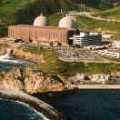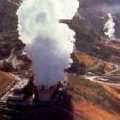|
作者 傑奇艾倫•朱利安諾博士
今日我坐在那
前人也曾坐過的地方,
千年之後,
後人也會來到。
誰是那歌唱者,
誰是那聆聽者?
-- Nguyen Cong Tru (越南詩人1778-1858)
不管是什麼原因造成現在的能源危機,在華盛頓,一項新保守施政的主要目標已然實現。空氣品質管制已暫時中止,目的是為了促成大規模的產業擴張。
部分家庭的家用電費已經上升了80%之多,布希當局並且在1月29日授權環保署放寬清淨空氣條例,讓加州可以生產更多的電力,然而大多數報紙並未報導這項史無前例的動作。有關為了因應需求而在發電過程中違反聯邦清淨空氣標準的加州發電廠和柴油發電機,對此環保署也表示,它將不會做任何強行取締。
2000年12月,加州開始減少它的空氣品質規章,讓曾經因為達到空氣污染限制而遭停機的一些南加州的電廠,重新運作。
這些行動將會戲劇性地和立即地影響我們的空氣品質。在國內各地,多年以來,很多燃燒石化燃料的發電廠都曾被檢舉違反清淨空氣標準。電力公司拒絕升級陳舊的設備,因為這類的維修會減少利潤。
在重度污染的南加州,El Segundo (地區),以燃燒天然氣發電的Scattergood電廠,依照空氣品質法規需被24小時監視著。當污染程度過高時,電廠得降低它的排放量。而現在,它可以不停地製造污染。

在加州Folsom的獨立系統操作中心的主要控制室,由12座電腦工作站發送供應加州電源至州境內的使用者。(照片提供
加州 ISO)
要注意的是,空氣污染不是由石化燃料電廠所產生對環境傷害的唯一形式。這座由洛杉磯水電部運作的Scattergood電廠,可以產生820百萬瓦之多的電力。它每天使用聖塔蒙尼卡灣中大量的水來冷卻它三個主要的渦輪機。每週都有上千條的魚,因為被吸入巨大的導管入口而死亡。
電廠可以每天排放高達4億9千5百萬加侖的水到海灣中。這些水包含清洗金屬的廢水和眾多其它污染物質,還包括風雨過境後所留下的地表溢流污水。這些水也是廢溫水,影響了沿岸生態系統。而能源供應的替代方案,不會像這樣子對環境造成衝擊。
空氣品質規章的中止,開了危險的先例。許多環保團體、政治分析家和市民認為,布希當局利用「加州能源短缺」為藉口,為全國工業不受限擴張來鋪路。

能源部祕書--史賓塞•亞伯拉罕支持發展美國石化燃料資源。
在目前極端保守的內閣裡,只剩極少的阻擋能力,可以不讓管理當局消除,唯一還能阻止我們的天空和肺因產業上的貪婪而被染黑的壁壘。否則,因而產生的空氣,水和土壤污染將會持續掠奪我們孩子的未來。
1992年國會在電力批發市場上,解除規章時播下此危機的種子。23州遂採行他們自己的解除管制的法規。自1996年加州解除了能源生產管制,而後加州州長比特•威爾森簽署AB1890號州議會法案,使其成為法律。對於那些自始至終都在密切注意這些事件的人來說,加州出現能源危機並不另人意外。山巒協會(Sierra Club)和其它許多環境和勞工團體一樣地譴責這項立法。
這些州也准許國內各地的電力公司,在轉換到替代能源公司的用戶的電費單上,增收附加費用和轉換費。這些費用被用來幫助電力公司,清償它們在核能電廠上的失敗投資。
經巧妙地偽裝而用來清償1千3百50億美元錯誤投資的這筆費用,是消費者的血汗錢。在加州和麻州,這一筆電力公司的共同(福利)經費,恐怕是佔了消費者的電費高達40%。
曾經被認為是我們能源對策的核能產業,已經一敗塗地。它的成本不僅超過數十億美元;用來應付設計失靈和致命核廢料的花費也暴漲;甚至為了取得費用,以處理那些早該被除役的反應爐所產生的核廢料,更是極盡所能地向消費者課稅,並且還持續下去。
然而,布希當局和許多州政府將企圖振興這致命且營運失敗的產業。布希總統已經開始研究如何簡化流程,以便建造更多的核子反應爐。
核能發電科技的危險性仍尚未降低。每座核能電廠產生如山堆積的耗用過的燃料棒。這些有輻射源的燃料棒,是用以製造所需的熱能來產生蒸氣,做為渦輪機發電的動力。

加州San Luis Obispo的 「Diablo峽谷核能發電廠」,由太平洋瓦斯電力公司營運。它自1986年 3月開始營業。(照片提供 美國能源管理委員會)
沒有人知道如何去處理這致命的放射性廢料,多數廢料只是堆積在核反應爐址的一個個水塘中。因不良設計而導致災難性的反應爐爐心熔毀的情況已有詳實紀錄的諸多案例,很多核電廠因此停機或遭廢棄。當反應爐爐心不能再被使用,這耗用過的爐心會被運至有害事業廢棄物場址加以掩埋,結果卻以污染地下水做為賭注。
在這些利害關係當中,僅有少數的領導者有談到替代能源,例如,以風力、太陽能、地熱和生物能來產生電力。
在能源短缺背後,不管是什麼理由或動機,我們的領導者的回應總是1. 提高電費﹔2. 增加空氣和水污染﹔和3. 指責消費者使用過多能源。
身為消費者,我們可以立即有所行動,但不是聽信政府或那些利用石化燃料發電的電力公司的花言巧語。保護自然資源﹔投資替代能源生產﹔和抵制石化燃料或核電廠的興建,都可降低危機。
這地球上總是會有豐富的能源。風、太陽,和在地球內部的天然熱能,都可以長久地提供免費的能源。

再生能源銷售公司買入由加州的間歇泉所產生的電力。它是世上最大的地熱區。(照片提供 國家再生能源實驗室)
小型電力公司正大膽地努力提供由自然資源所生產的電力。而在不久將來,會有愈來愈多的公司能為我們的家庭提供像燃料電池這一類的,各戶獨立、自用自足的電源選擇。
另人難過的是,市場力量對於他們的努力形成了相當的障礙。
當數十億美元被用在提煉和銷售地球上僅剩的石化燃料,資金短缺的替代性科技,其發展則會受到阻礙。這樣的狀況是有可能發生的。消費者必需立即去要求保存自然資源以及利用替代能源。
電力不只用來提供家庭和辦公室的照明與暖氣。在華盛頓州、俄勒岡州和加州,花在家畜產品上的電力約1百70億[瓦千]。這些電力足夠讓全國的房屋點亮一個半月。
製造一磅的牛肉要使用大約一加侖的油和3,000到5,000加侖的水。肉業和乳品業使用數百萬瓦特來汲水以維持牧場和屠宰場,並提供冷凍庫電力,和提供電力給廢棄物處理場來清理所產生的污染物。
要記住,我們的飲食和生活方式的選擇,不但影響了能源的生產,還有我們的健康與每年數以百萬計的動物生命。
到底,我們真正的能源需求和當務之急應該是什麼用在賭場、豪華旅館,或是整夜明亮的超高層大樓辦公室的能源,幫助了少數的富裕個人中飽私囊。但這對於讓貧民窟中受寒的兒童取得溫暖,沒多大幫助。
不管代價和有效性,你可以有很多節省能源的做法,如下所列:
- 別去相信那些能源需求勝過供給的言論。需求不會有明顯的改變。改變的是能源買賣的方式。
- 別相信供應必須符合需求的說法。對自然資源的保護,設備更新和生和生活方式的改變應是首選的解決對策。關上房門和關掉家中沒人在的房間的暖氣。提高房子的隔熱性,你可以汰換舊窗戶,或是買個可以維持室內溫暖的窗罩。
- 關掉房間內的燈會省下可觀的能源。當你開燈時,使用省電燈泡。
- 當你選購電器時,即使是小家電,先讀其商標並只買能源效率高的產品。寧可早上早點起床,用毛巾擦乾你的頭髮,而不使用那電量足可照亮全家的2000瓦吹風機。一些小家電和電子用品就佔了一個家庭內所有能源消耗量的14%。
- 要求你的顧主公告政策,指示職員在晚上關掉電燈。管理員通常會讓整棟大樓的燈整晚開著,而這使用了非常大量的能源。
選擇權是在我們手上。
參考資源
1.至青山能源公司的網站http://www.greenmountain.com/
default.asp。可閱讀到有關再生能源和能源效率的每日新聞。此則新聞是由環境新聞服務所提供。
2. 從美國高效率能源經濟評議會的網站中,找出如何讓家中能源使用更有效率,以及找出在今年示範年度裡,最「環保」的交通工具:http://www.aceee.org/。
3.至美國風力能源協會http://www.awea.org/認識在美國的風力發電。
4.至燃料電池2000的網站http://216.51.18.233/index_e.html認識燃料電池。
5.至美國太陽能協會http://www.ases.org/ 探索太陽能。
6.聯邦政府機構-國家再生能源實驗室的網站,有大量有關所有形式的再生能源的資訊。請至:http://www.nrel.gov
7.請寄電子郵件給美國總統喬治•布希president@whitehouse.gov,並告訴他,在蓋新電廠之前,環境保護是必要優先考慮的,並力促他別忽略了,工業擴展所需要的經過完整研究和重要的環境規範。
8.在「國家」雜誌中,一篇有關在此種處境背後的歷史的文章。另有更多相關歷史介紹的另一篇文章。
9.請參考,如何加強家中和公司能源效率的一些非常好的建議。http://www.ecomall.com/greenshopping/
rockesave.htm。
10.至替代能源學院網站http://www.altenergy.org/,認識替代能源的資源。
11.請參考替代能源的資源列表:http://www.serve.com/
commonpurpose/contacts.html
12.美國能源部和環境保護局共同地實施「能源之星」計劃。這是把能源效率高的產品和建築標上標籤,所以購買者可以在他們購買之前,確認這是省能源的產品。看看商店所在或尋找在產品上的能源之星標籤:例如洗衣機,電視和錄放影機,暖氣和冷氣機等,都是可以節省電費和保護環境。請至下列網站:http://www.energystar.gov
13.找找誰是你的國會議員代表並寄電子郵件給他們。要求他們減少商業上和工業上的能源使用,並建立使用替代能源的發電廠。告訴他們從他們的辦公室開始。你可以在下列的位址找到你的國會代表:http://congress.nw.dc.us/
innovate/index.html。
傑奇艾倫•朱利安諾博士,是住在西雅圖的一位作家和教師。當西雅圖辦公大樓的輪廓在夜晚中明亮地發光,你可以發現他坐在家中黑暗的房間內。告訴他你的想法和計劃。jackie@healingourworld.com和請參觀他的網站:http://www.healingourworld.com
全文與圖片詳見: http://www.ens.lycos.com/ens/feb2001/2001L-02-09g.html
版權歸屬Environment News Service(ENS),環境信託基金會( 林修誼 譯,黃媺雯、李瑞玉、蔡麗伶 審校)
中英對照全文:http://news.ngo.org.tw/issue/environ/
2001/environ01071701.htm |
|
By Jackie Alan Giuliano, Ph.D.
On the same spot I sit today
Others came, in ages past, to sit.
One thousand years, still others will come.
Who is the singer, and who is the listener?
-- Nguyen Cong Tru (Vietnamese Poet 1778-1858)
Whatever the cause of the current energy crisis, a major goal of the new conservative administration in Washington has been achieved. Air quality controls have been suspended and the stage has been set for massive industrial expansion.
Some household electric bills have gone up as much as 80 percent and in an unprecedented action that went unreported in most major newspapers, the Bush administration authorized the Environmental Protection Agency (EPA) on January 29 to relax clean air rules so that California can produce more power. The EPA said it will not enforce any violations against California power plants and diesel generators that violate federal clean air standards in the course of producing the electricity needed to meet the demand.
California began reducing its own air quality regulations in December 2000 allowing the restart of several power plants in southern California that had reached air pollution limits and had been shut down.
These actions will have a dramatic and immediate effect on our air quality. Many fossil fuel burning power plants around the nation have been cited for violating clean air standards over the years. They have antiquated equipment that the utility companies have refused to upgrade because such fixes could diminish profits.
In heavily polluted Southern California, the natural gas fired Scattergood Power Generating Plant in El Segundo is monitored 24 hours a day for air quality compliance. When the pollution levels get too high, the plant, has been reducing its output. Now, it can keep on polluting.
At 12 computers stations in the main control room of the California Independent System Operator in Folsom, California power supplies are routed to users throughout the state. (Photo courtesy
California ISO)
It is important to note that air pollution is not the only form of environmental damage generated by fossil fuel power plants. The Scattergood Plant, operated by the Los Angeles Department of Water and Power, can generate as much as 820 megawatts. It uses huge amounts of water from Santa Monica Bay each day to cool its three massive turbines. Thousands of fish each week are killed as they are sucked into the giant intake pipes.
It can discharge back into the bay up to 495 million gallons per day of that water which includes metal cleaning wastes and a host of other pollutants, including stormwater runoff. The water is also returned heated, affecting the nearshore ecosystem. Alternative energy sources do not impact the environment in this way.
The suspension of air quality regulations sets a dangerous precedent. Many environmental groups, political analysts and citizens think that the Bush administration has used the California energy shortages as an excuse to pave the way for the unregulated expansion of industries throughout the land.
Energy Secretary Spencer Abraham supports developing America's fossil fuel resources. (Photo courtesy Office of the former Senator)
With extreme conservative cabinet appointments now in place, there are few obstacles that will prevent the administration from removing the only barriers that have kept our skies and lungs from being blackened by industrial greed. The resulting air, water, and soil pollution will continue to rob our children of their future.
The seeds for this crisis were sown in 1992 when Congress lifted regulations on the wholesale power market. Twenty-three states followed with their own deregulation legislation. California's crisis is no surprise to those who have followed the events since the state deregulated energy production in 1996 when then California Governor Pete Wilson signed Assembly bill AB1890 into law. The Sierra Club and many other environmental and labor groups alike condemned this legislation.
States are also allowing utility companies across the nation to include surcharges on utility bills and transfer fees if a customer switches to an alternative energy company. These fees are designed to help the utility companies pay off bad investments in failed nuclear power plants.
These cleverly disguised fees will pay off the $135 billion of these bad investments with consumers' hard earned dollars. In California and Massachusetts, this corporate welfare may constitute as much as 40 percent of consumers' electric bills.
The nuclear industry, once thought to be the answer to our energy, has been a complete failure. Billions of dollars in cost overruns, skyrocketing costs to deal with design failures and the deadly nuclear waste that results, and the costs of handling the waste from reactors that have to be decommissioned have taxed consumers to the limit and continue to do so.
But the Bush administration and many states will attempt to revive this deadly and failed industry. The President has already begun studying how to streamline the process so that more nuclear reactors can be built.
The dangers of nuclear power generation technology have not decreased. Each nuclear power plant creates mountains of spent fuel rods, the radioactive sources that generate the heat necessary to create the steam that powers electricity generating turbines.
Diablo Canyon nuclear power plant at San Luis Obispo, California is operated by Pacific Gas and Electric. It has been operating since March 1986. (Photo courtesy U.S. Nuclear Regulatory Commission)
No one knows how to dispose of this deadly radioactive waste and much of it just builds up in ponds of water at nuclear reactor sites. Many nuclear plants were shut down or abandoned because of well documented cases of poor designs that could lead to a catastrophic meltdown. When a reactor core can no longer be used, the deadly spent core is transported to a hazardous waste site and buried, risking groundwater contamination.
In the midst of all these concerns, few leaders are speaking of alternative energy sources such as wind power, solar, geothermal and biomass power generation.
Whatever the reasons or motivations behind the energy shortages, our leaders are responding by increasing electricity costs, increasing air and water pollution, and blaming consumers for using too much power.
As consumers, we can act immediately, but not by buying into the rhetoric of the administration or the fossil fuel powered electric companies. Conservation, investments in alternative energy producers, and resistance to the construction of additional fossil fuel or nuclear plants, can lessen the crisis.
There is and has always been an abundance of energy on this Earth. The wind, the Sun, and the natural heat from inside our planet alone could supply us with free energy for lifetimes to come.
Renewable energy marketing companies buy power generated at The Geysers in California, the world's largest geothermal field. (Photo courtesy National Renewable Energy Lab)
Small utility companies are making a valiant effort to supply power generated from natural sources and soon, more and more companies will offer us the option of self-contained power sources, like fuel cells, for our homes.
Sadly, market forces have created significant obstacles to their efforts.
It is possible that underfunding of alternative technologies will stunt their growth while billions are spent extracting and selling the Earth's last remaining fossil fuels. Consumers need to demand that commitments be made to conservation and alternative energy sources immediately.
Electricity is not used just to light and heat homes and offices. Washington, Oregon, and California devote about 17 billion kilowatt hours of electricity to livestock production. That's enough energy to light every house in the entire country for a month and a half.
Manufacturing one pound of beef uses about one gallon of oil and 3,000 to 5,000 gallons of water. Meat and dairy farming uses many megawatts to pump that water, to run farms and slaughterhouses, power refrigeration and to power sewage plants to clean up some of the pollution produced.
It is important to remember that our diet and lifestyle choices affect power generation as well as our health and the lives of millions of animals each year.
What should our real energy needs and priorities be? The energy used by a casino, luxury hotel, or office skyscraper with its lights on all night helps line the pockets of a few affluent individuals, but it does little to warm a cold child in an inner city neighborhood.
There are many things you can do to conserve energy regardless of its cost and availability:
- Don't accept the rhetoric that the energy demand is outpacing the supply. Demand has not changed significantly. What has changed is the way power is bought and sold.
- Don't accept that supply should match the demand. Conservation, equipment upgrades, and lifestyle changes should be first on the list of remedies. Close doors and turn down the heat in your home in rooms that are not being used. Improve the insulation in your home and either replace old windows or get window coverings that will keep in heat.
- Turning off lights in rooms saves an amazing amount of energy. When you do use lights, use energy saving light bulbs. · When you buy appliances, even small ones, read the labels and buy only energy efficient ones. Get up a little earlier in the morning and towel dry your hair instead of using a 2,000 watt hair dryer that uses as much power as it takes to light your whole house. Small appliances and electronics account for 14 percent of the average household's total energy consumption.
- Ask your employer to issue policies instructing employees to turn off the company's office lights at night. Often janitors turn on all building lights and leave them on all night. This accounts for a huge amount of energy.
As ever, the choice is ours.
RESOURCES
1. Read daily news about renewable energy and energy efficiency on the Green Mountain Energy Company website at:
http://www.greenmountain.com/
default.asp. This news is provided by the Environment News Service.
2. Find out how to make homes more energy efficient and what the greenest vehicles are for this model year from the American Council for an Energy-Efficient Economy at:
http://www.aceee.org/
3. Learn about wind power in the United States from the American Wind Energy Association at:
http://www.awea.org/
4. Learn more about fuel cells at the Fuel Cells 2000 website at: http://216.51.18.233/index_e.html
5. Explore solar energy with the American Solar Energy Society at: http://www.ases.org/
6. There is a great deal of information about all forms of renewable energy on the website of the National Renewable Energy Laboratory, a federal government agency. Visit:
http://www.nrel.gov
7. Email President George W. Bush at president@whitehouse.gov and tell him conservation must be a priority before new power plants are built. Urge him to not ignore well researched and important environmental standards for the sake of industry expansion.
8. Read an article in "The Nation" magazine about the history behind this situation. Read
another Nation article with more history.
9. See some excellent tips for increasing energy efficiency in your home and business at:
http://www.ecomall.com/greenshopping/
rockesave.htm
10. Learn about alternative energy sources from the Alternative Energy Institute at:
http://www.altenergy.org/
11. See a list of alternative energy resources at: http://www.serve.com/
commonpurpose/contacts.html
12. The U.S. Department of Energy and the U.S. Environmental Protection agency jointly conduct the Energy Star program that labels energy efficient products and buildings so buyers can identify energy savings before they purchase. Check out a store locator or just look for the Energy Star label on products like clothes washers, TVs and VCRs, heating and cooling equipment that will save money on energy bills and help the environment. Learn about it at:
http://www.energystar.gov
13. Find out who your Congressional representatives are and e-mail them. Demand that they reduce the energy use of business and industry and build new power plants that use alternative energy sources. Tell them to start with their own offices. You can find your representatives at:
http://congress.nw.dc.us/innovate/
index.html
[Jackie Alan Giuliano, Ph.D. is a writer and teacher in Seattle. He can be found sitting in a darkened room at home while the Seattle skyline of office towers burns brightly at night. Send your thoughts and ideas to him at
jackie@healingourworld.com and visit his web site at
http://www.healingourworld.com]
http://www.ens.lycos.com/ens/feb2001/2001L-02-09g.html
|
